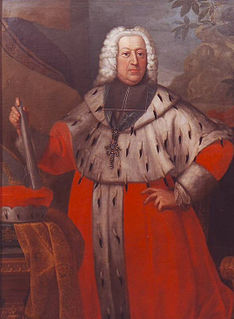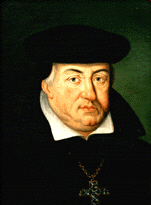| Jakob von Liebenstein | |
|---|---|
| Archbishop of Mainz | |
Jakob von Liebenstein (engraving 17th century) | |
| Church | Catholic Church |
| Diocese | Electorate of Mainz |
| In office | 1504–1508 |
| Personal details | |
| Born | 1462 |
| Died | 15 September 1508 |
Jacob of Liebenstein (German : Jakob von Liebenstein) (1462–1508) was the Archbishop-Elector of Mainz from 1504 to 1508.

German is a West Germanic language that is mainly spoken in Central Europe. It is the most widely spoken and official or co-official language in Germany, Austria, Switzerland, South Tyrol (Italy), the German-speaking Community of Belgium, and Liechtenstein. It is also one of the three official languages of Luxembourg and a co-official language in the Opole Voivodeship in Poland. The languages which are most similar to German are the other members of the West Germanic language branch: Afrikaans, Dutch, English, the Frisian languages, Low German/Low Saxon, Luxembourgish, and Yiddish. There are also strong similarities in vocabulary with Danish, Norwegian and Swedish, although those belong to the North Germanic group. German is the second most widely spoken Germanic language, after English.



















